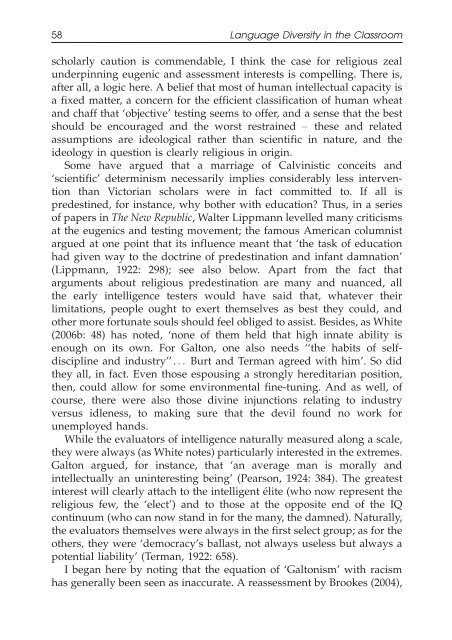Language Diversity in the Classroom - ymerleksi - home
Language Diversity in the Classroom - ymerleksi - home
Language Diversity in the Classroom - ymerleksi - home
- No tags were found...
Create successful ePaper yourself
Turn your PDF publications into a flip-book with our unique Google optimized e-Paper software.
58 <strong>Language</strong> <strong>Diversity</strong> <strong>in</strong> <strong>the</strong> <strong>Classroom</strong>scholarly caution is commendable, I th<strong>in</strong>k <strong>the</strong> case for religious zealunderp<strong>in</strong>n<strong>in</strong>g eugenic and assessment <strong>in</strong>terests is compell<strong>in</strong>g. There is,after all, a logic here. A belief that most of human <strong>in</strong>tellectual capacity isa fixed matter, a concern for <strong>the</strong> efficient classification of human wheatand chaff that ‘objective’ test<strong>in</strong>g seems to offer, and a sense that <strong>the</strong> bestshould be encouraged and <strong>the</strong> worst restra<strong>in</strong>ed <strong>the</strong>se and relatedassumptions are ideological ra<strong>the</strong>r than scientific <strong>in</strong> nature, and <strong>the</strong>ideology <strong>in</strong> question is clearly religious <strong>in</strong> orig<strong>in</strong>.Some have argued that a marriage of Calv<strong>in</strong>istic conceits and‘scientific’ determ<strong>in</strong>ism necessarily implies considerably less <strong>in</strong>terventionthan Victorian scholars were <strong>in</strong> fact committed to. If all ispredest<strong>in</strong>ed, for <strong>in</strong>stance, why bo<strong>the</strong>r with education? Thus, <strong>in</strong> a seriesof papers <strong>in</strong> The New Republic, Walter Lippmann levelled many criticismsat <strong>the</strong> eugenics and test<strong>in</strong>g movement; <strong>the</strong> famous American columnistargued at one po<strong>in</strong>t that its <strong>in</strong>fluence meant that ‘<strong>the</strong> task of educationhad given way to <strong>the</strong> doctr<strong>in</strong>e of predest<strong>in</strong>ation and <strong>in</strong>fant damnation’(Lippmann, 1922: 298); see also below. Apart from <strong>the</strong> fact thatarguments about religious predest<strong>in</strong>ation are many and nuanced, all<strong>the</strong> early <strong>in</strong>telligence testers would have said that, whatever <strong>the</strong>irlimitations, people ought to exert <strong>the</strong>mselves as best <strong>the</strong>y could, ando<strong>the</strong>r more fortunate souls should feel obliged to assist. Besides, as White(2006b: 48) has noted, ‘none of <strong>the</strong>m held that high <strong>in</strong>nate ability isenough on its own. For Galton, one also needs ‘‘<strong>the</strong> habits of selfdiscipl<strong>in</strong>eand <strong>in</strong>dustry’’... Burt and Terman agreed with him’. So did<strong>the</strong>y all, <strong>in</strong> fact. Even those espous<strong>in</strong>g a strongly hereditarian position,<strong>the</strong>n, could allow for some environmental f<strong>in</strong>e-tun<strong>in</strong>g. And as well, ofcourse, <strong>the</strong>re were also those div<strong>in</strong>e <strong>in</strong>junctions relat<strong>in</strong>g to <strong>in</strong>dustryversus idleness, to mak<strong>in</strong>g sure that <strong>the</strong> devil found no work forunemployed hands.While <strong>the</strong> evaluators of <strong>in</strong>telligence naturally measured along a scale,<strong>the</strong>y were always (as White notes) particularly <strong>in</strong>terested <strong>in</strong> <strong>the</strong> extremes.Galton argued, for <strong>in</strong>stance, that ‘an average man is morally and<strong>in</strong>tellectually an un<strong>in</strong>terest<strong>in</strong>g be<strong>in</strong>g’ (Pearson, 1924: 384). The greatest<strong>in</strong>terest will clearly attach to <strong>the</strong> <strong>in</strong>telligent élite (who now represent <strong>the</strong>religious few, <strong>the</strong> ‘elect’) and to those at <strong>the</strong> opposite end of <strong>the</strong> IQcont<strong>in</strong>uum (who can now stand <strong>in</strong> for <strong>the</strong> many, <strong>the</strong> damned). Naturally,<strong>the</strong> evaluators <strong>the</strong>mselves were always <strong>in</strong> <strong>the</strong> first select group; as for <strong>the</strong>o<strong>the</strong>rs, <strong>the</strong>y were ‘democracy’s ballast, not always useless but always apotential liability’ (Terman, 1922: 658).I began here by not<strong>in</strong>g that <strong>the</strong> equation of ‘Galtonism’ with racismhas generally been seen as <strong>in</strong>accurate. A reassessment by Brookes (2004),
















